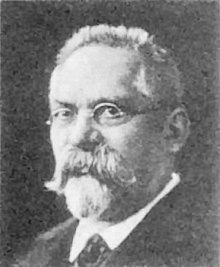Wilhelm Pfannkuch


Wilhelm Pfannkuch (born November 28, 1841 in Kassel , † September 14, 1923 in Berlin ) was a German politician ( SPD ) and trade unionist .
Live and act
Pfannkuch was born the son of a worker and attended the public school in Kassel. He also did an apprenticeship as a carpenter there and then went on a journeyman's hike for several years. During this time he became a member of the Berlin workers' association in 1862 . In Berlin he also met Ferdinand Lassalle and, impressed by him, joined the ADAV in 1863 . From 1865 he was a gifted agitator for the party in Northern Hesse . Pfannkuch became the founder of the ADAV congregation in Kassel in 1866 or 1867. This consisted mainly of cigar workers and employees of the Henschel works and after a short time had 260 members. As a result, other local groups emerged which, with the participation of Pfannkuch, merged to form a regional organization.
In 1868 he became a co-founder of the General German Workers' Union , the umbrella organization of the unions related to the ADAV . He was also involved in the formation of a number of individual trade unions.
Pfannkuch traveled in 1869 to Eisenach for founding congress of the SDAP of August Bebel and Wilhelm Liebknecht . In contrast to other supporters of the ADAV, Pfannkuch did not join the new organization because he was unable to assert himself with his emphatically reformist positions.
After his marriage in 1871, he joined the Royal Railway Workshops in Kassel as a pit master . In order not to lose this position, he had to temporarily stop his political and trade union activities. However, as early as 1875 he was a participant in the unification congress of ADAV and SDAP to SAP (the immediate predecessor organization of the SPD ). Probably because of his renewed political activity, he lost his job with the railroad again.
In 1877 he became editor of the social democratic newspaper Volksbote in Kassel. But just a year later in connection with the socialist law , the newspaper was banned. As a result, Pfannkuch worked as a small trader until 1887 and then as a carpenter in Kassel. However, he ran for a constituency in North Hesse for the Reichstag as early as 1884 and only just lost to his conservative opponent. Nevertheless, he moved into the Reichstag for the first time that year because Wilhelm Hasenclever was elected in two constituencies and waived a mandate in favor of Pfannkuch.
From 1889 to 1892 he was an editor for the association newspapers of various trade unions based in Kassel and then for a short time editor of the Neue Tischlerzeitung based in Hamburg. As early as 1890 Pfannkuch was co-founder of the trade union umbrella organization General Commission of the Trade Unions of Germany and in 1893 of the independent woodworkers' association.
From January 1893 until his death Pfannkuch worked as a paid board member in the central SPD party executive in Berlin. There he worked as the party's treasurer for years. He was also a city councilor in Berlin between 1900 and 1923. From 1898 to 1907 and from 1912 to 1918 he was again a member of the Reichstag. From 1898 to 1907 he was even a member of the board of the social democratic group. During the November Revolution, Pfannkuch supported Friedrich Ebert and Philipp Scheidemann's course . In 1919 he was elected to the Weimar National Assembly and was its age president . In the following years he campaigned for the reunification of the USPD and MSPD , and Pfannkuch was still able to take part in this act at the Nuremberg party congress in 1922.
literature
- Wilhelm Pfannkuch . In: Franz Osterroth : Biographical Lexicon of Socialism . Deceased personalities . Vol. 1. JHW Dietz Nachf., Hanover 1960, pp. 238-239.
- Ernst Hackethal: Pfannkuch, Wilhelm . In: History of the German labor movement. Biographical Lexicon . Dietz Verlag, Berlin 1970, pp. 363-364.
- Wilhelm Heinz Schröder : Social Democratic Parliamentarians in the German Reich and Landtag 1867-1933. Biographies, chronicles, election documentation. A handbook (= handbooks on the history of parliamentarism and political parties. Volume 7). Droste, Düsseldorf 1995, ISBN 3-7700-5192-0 , pp. 650-651.
Web links
- Literature by and about Wilhelm Pfannkuch in the catalog of the German National Library
- Wilhelm Pfannkuch in the database of members of the Reichstag
- Biography Pfannkuch of the SPD Hessen-Nord ( Memento from August 22, 2006 in the Internet Archive )
- Short biography (English) ( Memento of 21 December 2007 at the Internet Archive )
| personal data | |
|---|---|
| SURNAME | Pfannkuch, Wilhelm |
| BRIEF DESCRIPTION | German politician (SPD) and trade unionist, MdR |
| DATE OF BIRTH | November 28, 1841 |
| PLACE OF BIRTH | kassel |
| DATE OF DEATH | September 14, 1923 |
| Place of death | Berlin |
